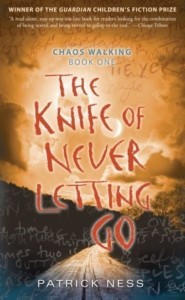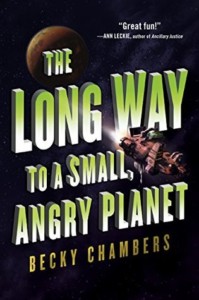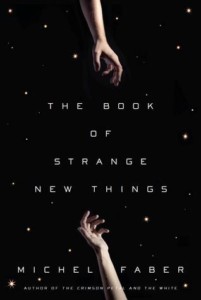
One of my favorite books, Patrick Ness’s The Knife of Never Letting Go (2008, 479 pages), is ten years old this year! It tells the story of Todd, the youngest boy in a town of only men. Because of something that happened long ago, shortly after colonists arrived on this new planet, there are no women living in Prentisstown, and all its citizens can hear one another’s thoughts. But Prentisstown is home to a dark secret, one which Todd will be told on his upcoming thirteenth birthday. What follows is a dark adventure story with twists and turns galore. Two sequels, The Ask and the Answer and Monsters of Men, continue the action.
I am not a habitual science fiction reader, so when I love a book set on another planet, you know it’s going to be good. So, in honor of a decade with The Knife of Never Letting
Go, here are some other winners that don’t take place in our world.

The Long Way to a Small, Angry Planet by Becky Chambers (2014, 443 pages):
Rosemary Harper joins the crew of a beaten-up spaceship called the Wayfarer as a way to escape the confines of her past. Along with the exploration she craves, she finds the love of a new family aboard the ship. A found-family space opera full of weird and exciting adventures with friends, this is a feel-good romp, perfect for fans of Joss Whedon’s cult favorite sci fi show Firefly.

The Sparrow by Mary Doria Russell (1996, 408 pages):
A deeply philosophical novel usually has a high concept and a slow burn, and this one is no exception. It begins with its hero, Jesuit priest Emilio Sandoz, returning to Earth in 2060, decades after accompanying a mission to make contact with alien life. Emilio is the only survivor. As Emilio begins to heal, physically and psychologically, from what he has endured, he begins to tell his companions what he’s seen while he’s been away. This is a book with real staying power, about humanity’s curiosity, the failure of good intentions, and the nature of morality, written so beautifully that it never fails to dazzle.

Sunshine by Robin McKinley (2003, 405 pages)
Okay, this one isn’t set in space, but hear me out: it’s got a world all its own, so weird and wonderful you won’t be able to keep yourself from falling in love with it. Rae Seddon lives a very ordinary life working in her family coffee shop, where she is famous for her “cinnamon rolls as big as your head.” But Rae is anything but ordinary, which she is forced to confront when an impromptu trip to her grandmother’s old lake house ends with her kidnapped by vampires. There’s magic, but the rules that govern it are so logically relayed that it feels more like science fiction than fantasy. Demon registries, magic cops, and sorcery are woven expertly through this luminous tale of danger and tenderness.

The Martian by Andy Weir (2014, 387 pages)
I’m sure by now you’ve all heard about this sleeper hit, especially since the Matt Damon-starring film, but if you haven’t read it, you should! I once described this as “Hatchet in space mixed with a math word problem, only funny,” and I stand by that. Mark Watney, an astronaut stranded on Mars after an expedition goes horribly wrong, has to rely on his wits to survive in an environment not conducive to human life. Astronaut work is very physical as well as very cerebral, and Weir has a good sense of the complex mind it would take to succeed in the way Watney must. Most of the book is him by himself, thinking, but there is a realistic sense of danger and excitement that pervades the book, and Watney is a character it’s easy to root for.

The Book of Strange New Things by Michel Faber (2014, 500 pages)
No list of world-traveling fiction would be complete without Michel Faber’s meditative epic. Did I have to include two books about space-traveling missionaries and the aliens they care for? Well, yes. I love both so deeply that there’s no leaving either of them out. This one follows evangelical pastor Peter, who has been hired by a corporation called USIC to come along on a colonizing expedition to a planet called Oasis and preach to the locals. Inspired by his faith as well as the promised pay check, he leaves his wife on Earth, promising to return when his time is up. Space is tedious and lonely for Peter, who has little in common with his fellow USIC employees, but the native Oasians are kind and interested in his teachings. Still, questions present themselves: what happened to the last preacher, who disappeared? What disasters are befalling the Earth? Will Peter ever get to go home? With a dreamy atmosphere that hides a hefty punch, this book is one you’ll be thinking about for years.
-Melinda, Public Services Librarian
